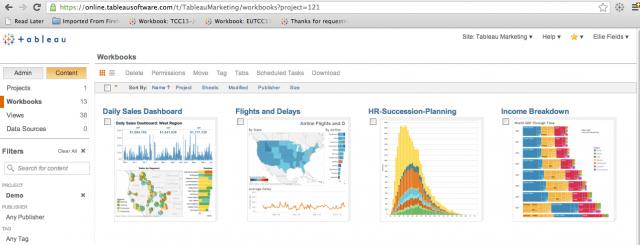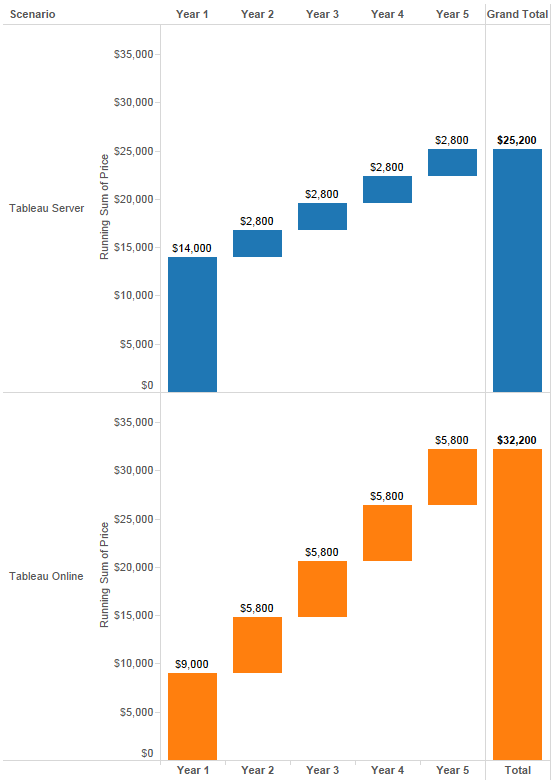Last year, in July, Tableau Software introduced Tableau Online, their cloud-based product. Over 1000 companies adopted Tableau Online in the first nine months in market, making it Tableau’s fastest-growing product. Tableau has dominated the BI market with 80% growth in just the last year. Transitioning Big Data into cloud computing seems to be the wave of the future.

With no hardware and no internal IT staff, the question arises:
Why isn’t everyone doing this?
The answer is a complex one. While Tableau Online is a great solution for some companies, a cloud-based visualization solution is not the ideal answer for everyone. Below are five considerations that will help your organization determine which solution is best for you.
1. Cost
There’s no sense in mucking about – cost is the primary driver in most business decisions. Let’s start here. Both solutions still require report publishers to have Tableau Desktop, which is $1600 per user in one-time licensing and $400 per year in maintenance. That’s a fixed cost regardless of solution.
The per-user license cost for Tableau Server is $800 and $200 per year for maintenance. So, a report publisher requires both Tableau Desktop and Tableau Server or for a total cost of $3000 initially and $600 recurring per year.
Tableau Online eliminates the need for a server environment, which includes hardware, deployment and maintenance. One report publisher costs $2500 initially. That figure breaks down to $1600 for Tableau Desktop, $400 for maintenance and $500 for the Tableau Online license. One publisher will then cost $900 per year afterwards for continued maintenance and access to Tableau Online.
Let’s create a basic cost analysis for two report publishers and eight additional report viewers – that’s 10 total viewers:
- For the Tableau Server environment, the starting cost is $14,000 and another $2,800 each following year. Also, you have costs for your configuration. Over a five-year period, the total cost of this solution is $25,200.
- Tableau Online costs $9,000 to start, but $5,800 each year thereafter. The cost on this solution over a five-year period is $32,200.
Here’s a visual aid:

Tableau Server does offer a cost efficiency if you were to just consider the licensing and software costs. Offsetting the costs of the server deployment for Tableau Server might actually match the costs of moving your data sources into the cloud environment for Tableau Online (see below).
As you can see, there are quite a few numbers to keep in mind when making a valid cost-benefit analysis.
2. Data Shifting
Perhaps the biggest deterrent from migrating to Tableau Online from Tableau Server is that the data sources must also reside online. Tableau has invested a great deal of their resources to ensure data security and high performance to this end. They are constantly monitoring system-wide performance and upgrading where necessary.

For companies with massive, pre-existing data warehouses or with information that is required to remain onsite for legal or security reasons, shifting to Tableau’s hosted data environment can be prohibitive. There is also an upper limit to how much data can be stored within Tableau Online, and there are associated costs for exceeding that limit.
3. Hybrid Option
Of course, that naturally brings the point of using Tableau data extracts in Tableau Online while maintaining a proprietary data warehouse. This does not address any legal obstacles regarding the safe-keeping and security of your data. As per data extracts in general, there could be synchronization issues if the data source is transactional.
From a cost standpoint, you are now incurring costs for both solutions. Depending on the segmentation of your end users, this is likely not the most cost-efficient solution.
4. Compatibility
Another great selling point for Tableau Online is that it can communicate directly with other cloud-based analytics services, such as Google BigQuery and Amazon Redshift. It also has compatibility with Salesforce and Google Analytics.

It’s reasonable to assume that as the notion of “data gravity” shifts from data warehouses to cloud computing, additional synergies online will continue to evolve. Simply put, the more data that transitions into the cloud, the more services and advantages will continue to appear.
5. Hosted Solution
Another solution is to host your data and Tableau Server with a third-party vendor. This way, you get the benefits of both worlds. You eliminate the need for an internal team to deploy and maintain your server just as you would with Tableau Online. You also get a much higher degree of input on where your data resides and on performance parameters.

By choosing InterWorks, you also get a vendor that is a world leader in business intelligence consulting as well as Tableau’s VAR Partner of the Year (2013, 2014, 2015) and Training Partner of the Year (2015).
Conclusion
Tableau Online, Tableau Server or even a third-party vendor each offer the power of data visualization. Finding the solution that is right for you takes a little consideration on the unique requirements of your data sources, your end users and your business goals.
If you have any questions, we can certainly help you find the answers.


